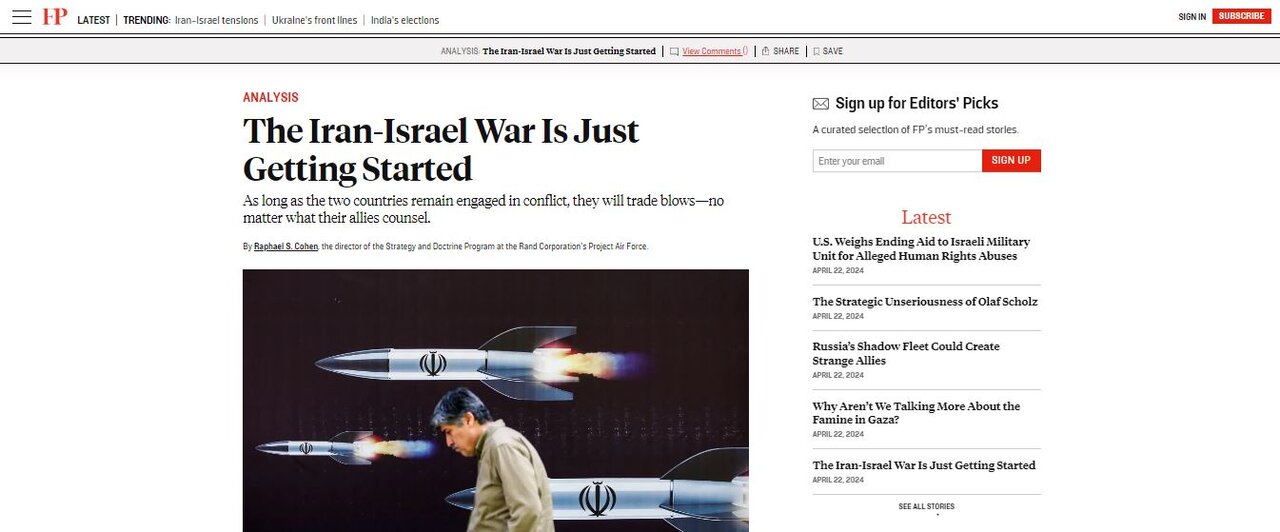No more options against Iran

TEHRAN - There are renewed calls among Western media and Israeli-affiliated think tanks to up pressure on Iran after the country carried out a historic attack against the occupied territories with impressive success.
While the supposed analysts and pundits are quick at assembling excuses to justify an escalation of tensions with Iran, a look at their commentary shows that coming up with strategies to turn the screw on Iran does not come as easy to them.
An article appearing on the Foreign Affairs titled "the Iran-Israel war is just getting started" unwittingly highlighted Israel and Western states' limited options against Tehran.
The author of the article is a member of the RAND Corporation, a research institution that claims NGO status despite acknowledgment of funding from the U.S. government and undisclosed foreign states. RAND has a controversial history of endorsing terrorism and advocating for war in West Asia.
In 2017, the Organization suggested that Al Qaeda could be considered an alternative to the Syrian government due to its new "moderate face". It used unverified and later debunked claims, like the use of chemical weapons by Syrian authorities, to justify its argument for toppling Bashar Assad's legitimate rule, even if that meant notorious terrorists would take charge instead.
In 2011, RAND defended NATO's military intervention in Libya, by arguing that the airstrikes against the Arab country were lawful under the 1973 United Nations Security Council Resolution as it helped avert a potential genocide in Libya. By the time of the military intervention less than 1000 people had lost their lives in the Arab country. The organization has yet to make similar arguments in regards to Gaza despite the death of over 34,000 civilians in the past 7 months.
A closer examination of RAND's history and its alumni further reveals a pattern of promoting military actions and violence. For instance, the current head of the institution, Jason Gaverick Matheny, helped bomb innocent civilians in Afghanistan and Yugoslavia during his time in the U.S. Air Force.
You might fear that more such scenarios are to occur in West Asia as a few thousand more casualties would probably not make Matheny and his fellows lose sleep at night. But even for the masters of inciting and justifying war and destruction, initiating hostilities is not always a simple process.
Iran has already withstood all pressure tools
The Foreign Affairs' article published on April 22 conveniently offers justifications for warmongering forces seeking to escalate tensions with Tehran. Iran is presented as the source of instability in the region, who violated a redline by responding to Israel's unprecedented attack on the Iranian embassy in Damascus. Both Iran's retaliation on April 14 and Israel's subsequent response on April 19 are hailed as victories for Zionists as an attempt to downplay Iran's capabilities. The narrative then encourages the EU and Washington to acknowledge the necessity of escalating tensions with Iran, despite the recent perceived weakness during the exchange of fire with Israel, as Iran's potential nuclear armament could pose a significant threat.
However, the article, despite its distortions, falls short of proposing viable solutions for the West to counter Iran, maybe because Western powers have already exhausted all available options.
Over the past few decades, sanctions have failed to compel Iran to curtail its defense capabilities or cease backing anti-colonial movements in the region. Following an extended period of sanctions, Tehran is gradually moving towards insulation, and as more nations pursue de-dollarization, the effectiveness of Western embargoes is anticipated to diminish over time.
The West Asian country has repeatedly demonstrated its lack of nuclear ambitions. Despite the fallout of the JCPOA and the West's defacto withdrawal from the agreement, Iran continues to collaborate extensively with the IAEA.
Finally, the military option is now completely off the table, given Iran's recent defensive and offensive successes in the month of April, which have shielded the country from direct military assaults more than ever before.
So what is the West left with? It may be a bitter pill to swallow, but faced with their dwindling influence over Iran, the Western powers and Israel need to embrace a path toward peace and stability in the region sooner or later.
Leave a Comment